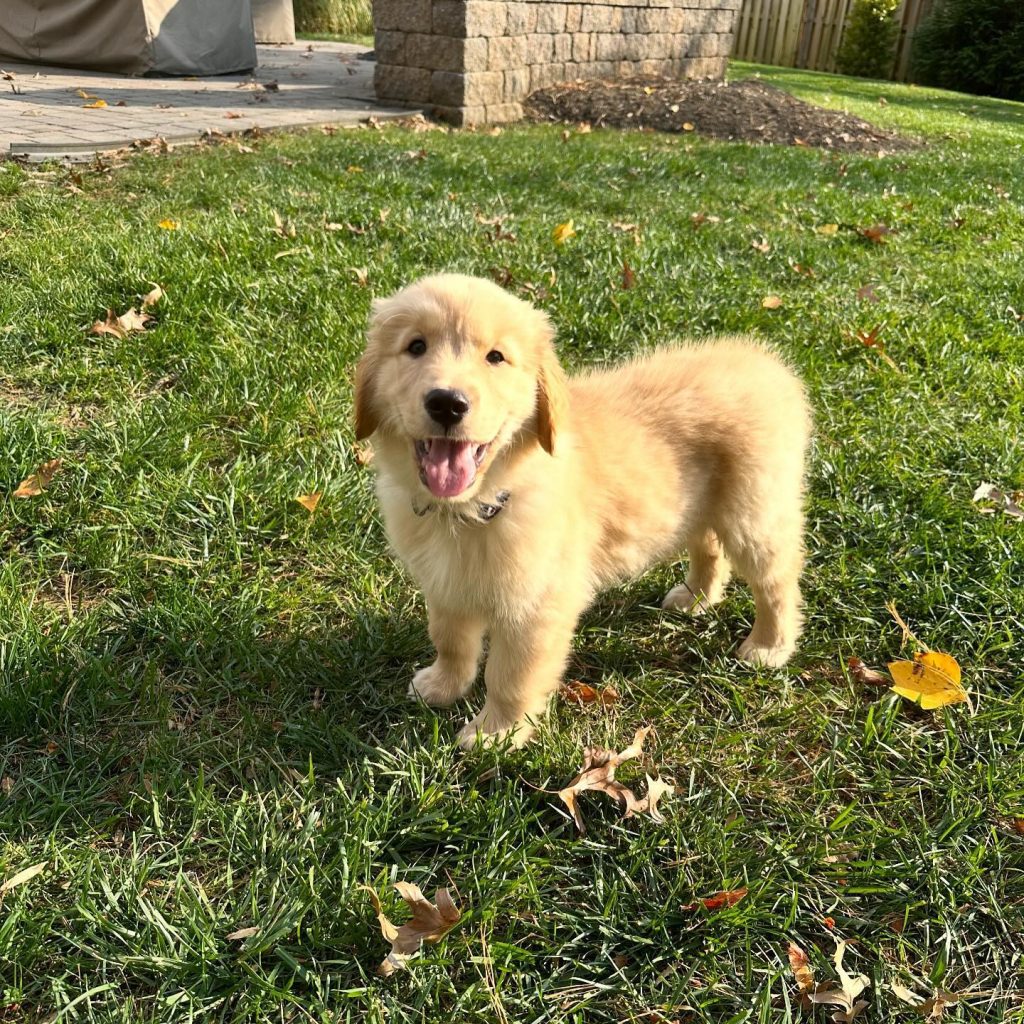
Overview of the Golden Retriever
The Golden Retriever is one of the most beloved and recognizable dog breeds worldwide, renowned for its friendly demeanor, intelligence, and beautiful golden coat. Originating in the Scottish Highlands in the late 19th century, this breed was initially developed for retrieving games during hunting expeditions. Today, Golden Retrievers excel in various roles, from family pets and therapy dogs to search-and-rescue heroes and assistance dogs for people with disabilities.
See Also: Golden Retriever Training
Quick Facts
Golden Retrievers are medium to large-sized dogs characterized by their dense, water-repellent outer coat and thick undercoat. They possess a kind, friendly eye, expressing intelligence and eagerness to please, which mirrors their personality. They are known for their versatility and are adept at various activities, including obedience, agility, competitive events, and more. Their gentle mouth is perfect for retrieving games unharmed, a trait that has made them excellent hunting companions and search-and-rescue dogs.
AKC Breed Popularity Ranking
According to the American Kennel Club (AKC), the Golden Retriever consistently ranks among the top three most popular dog breeds in the United States. Their popularity is a testament to their adaptability, friendly nature, and ability to fit into various roles and family types. Their intelligence and trainability make them a top choice for families, as well as for roles in service and therapy.
Key Characteristics
The Golden Retriever is distinguished by a range of physical and temperamental characteristics that make it a versatile and adaptable breed, suitable for various roles and lifestyles.
Physical Traits
The Golden Retriever’s physical attributes are a testament to its breeding as a hardworking, robust dog capable of enduring long days in the field while still being a gentle, approachable companion at home.
Height
Adult Golden Retrievers typically stand between 23 and 24 inches tall at the withers, while females are slightly smaller, ranging from 21.5 to 22.5 inches. This size allows them to be agile and powerful without being overly bulky or cumbersome, ideal for their intended initial role of retrieving the game.
Weight
Weight varies between males and females, with males generally weighing between 65 and 75 pounds and females between 55 and 65 pounds. Their weight should be proportionate to their height, maintaining a balanced and well-conditioned physique that reflects their active nature.
Life Expectancy
Golden Retrievers have a life expectancy of 10 to 12 years. With proper care, regular veterinary check-ups, and a healthy lifestyle, many Goldens live to their early teens, providing their families with years of joy and companionship.
Breed Colors & Markings

The hallmark of the Golden Retriever is its lush, water-repellent outer coat that comes in various shades of gold. The breed standard recognizes a broad spectrum of gold, from light cream to a rich, lustrous golden hue, but does not include extremely pale or red tones.
- Light Golden: A pale, cream-colored coat that may appear almost white in the sunlight.
- Golden: The classic, well-recognized medium golden shade that epitomizes the breed.
- Dark Golden: A deeper, richer golden color, often with a hint of red, but still within the breed’s color spectrum.
Markings are generally uniform, but some Goldens may have lighter feathering on their underbelly, tail, and legs. The breed standard does not include white markings, except for a few stray hairs on the chest, which are permissible but not desirable. The overall appearance should be that of a symmetrical, powerful, active dog, sound and well put together, not clumsy nor long in the leg, displaying a kindly expression and possessing an eager, alert, and self-confident personality.
Dog Breed Traits & Characteristics
Golden Retrievers are cherished not only for their stunning appearance but also for their remarkable personality and behavioral traits. These dogs are known for their friendly nature, intelligence, and versatility, making them suitable for various roles, including family pets, service dogs, and more.
Golden Retriever Personality and Behavior
Golden Retrievers are renowned for their gentle, friendly nature. They exhibit a profound affection for their families, making them excellent companions.
Affectionate With Family
Golden Retrievers are highly affectionate with their family members. They thrive on human interaction and are happiest when involved in family activities. Their loyalty and desire to please make them endearing pets that form strong bonds with their owners.
Good With Young Children
This breed is known for its patience and gentleness, making it an ideal choice for families with young children. Golden Retrievers are tolerant and can handle the unpredictable behavior of children, often becoming their protective and loving playmates.
Good With Other Dogs
Golden Retrievers generally get along well with other dogs. Their social nature and eagerness to play make them great companions for other pets in the household. Proper socialization from a young age helps ensure they remain friendly and outgoing.
Openness To Strangers
These dogs are typically open and friendly towards strangers, often greeting them with a wagging tail and an expectant look. Their amiable disposition makes them poor guard dogs but excellent ambassadors of the canine world.
Playfulness Level
Golden Retrievers have a high playfulness level, retaining their puppy-like zest for life well into adulthood. They love interactive games and are always ready for fetch or swimming in the lake, making them joyful companions.
Adaptability and Training
Golden Retrievers are highly adaptable, intelligent dogs known for their ease of training and ability to thrive in various environments.
Trainability Level
Their eagerness to please and intelligent nature make Golden Retrievers highly trainable. They excel in obedience agility and are often used as service and therapy dogs due to their quick learning ability and desire to work.
Adaptability Level
This breed adapts well to different living situations, from apartments to large homes with yards, as long as their physical and emotional needs are met. Their flexible nature suits them to various lifestyles, although they do best in environments where they can be close to their families.
Physical Needs

Golden Retrievers are active dogs with significant physical needs that must be met to keep them healthy and happy.
Energy Level
Golden Retrievers have a moderate to high energy level. They require regular, vigorous exercise to maintain their health and happiness. Without adequate activity, they can become bored and may exhibit destructive behaviors.
Exercise Needs
Daily exercise is crucial for a Golden Retriever. They enjoy long walks, runs, and hikes, and especially love swimming. Play sessions and activities stimulating their mind and body are essential for their well-being.
Grooming and Health
Regular grooming is vital to keep a Golden Retriever’s coat healthy and to manage shedding.
Shedding Level
Golden Retrievers are known for their dense, water-repellent outer coat, which sheds seasonally. Regular brushing helps manage shedding and keeps the coat in good condition.
Coat Grooming Frequency
Brushing a Golden Retriever’s coat at least twice a week is recommended, increasing to daily during heavy shedding periods. This helps prevent mats and keeps the skin and coat healthy.
Recommended Health Tests From the National Breed Club
The National Breed Club recommends several health tests for Golden Retrievers, including evaluations for hip dysplasia, elbow dysplasia, cardiac issues, and eye conditions. These tests help ensure the health and longevity of the breed. Regular check-ups and adhering to a preventative healthcare routine can help catch and manage potential health issues early on.
Caring for a Golden Retriever Health
Proper care is crucial to maintaining a Golden Retriever’s health, happiness, and longevity. This involves a comprehensive approach that includes attention to their health and wellness, nutrition, exercise, training, and grooming.
Health and Wellness
Ensuring the health and wellness of a Golden Retriever requires regular veterinary check-ups and a proactive approach to managing their well-being.
General Health
Golden Retrievers are generally healthy, but like all breeds, they’re prone to specific health conditions. Regular vet visits, vaccinations, and preventative care are crucial. Monitoring their health for signs of common issues is also essential.
Dealing with Common Health Issues
Golden Retrievers may be susceptible to hip dysplasia, elbow dysplasia, heart conditions, and specific eye problems. Early detection and management of these conditions can significantly improve quality of life. Regular health screenings and adhering to a care plan prescribed by a veterinarian are essential.
Nutrition and Diet
- Balanced Diet: Feed high-quality dog food appropriate for their age, size, and activity level.
- Portion Control: Monitor their food intake to prevent obesity, a common problem in the breed.
- Special Dietary Needs: Consult with a vet for any special dietary needs, particularly as they age or if health issues arise.
Exercise and Activities
- Daily Exercise: At least one hour, including walks, runs, and playtime.
- Mental Stimulation: Incorporate training sessions and puzzle toys to engage their minds.
- Swimming: Many Golden Retrievers love water, making swimming a fun exercise.
Training and Socialization

- Early Socialization: Expose them to different people, animals, and environments from a young age.
- Positive Reinforcement: Use treats, praise, and play to encourage good behavior.
- Consistency: Maintain consistent rules and routines for training and behavioral development.
Grooming Essentials
- Regular Brushing: Brush their coat at least twice weekly to manage shedding and prevent mats.
- Ear Care: Check and clean their ears regularly to prevent infections.
- Nail Trimming: Trim nails regularly to prevent discomfort and mobility issues.
- Dental Care: Regular teeth brushing and veterinary dental checks are essential for oral health.
Caring for a Golden Retriever involves a commitment to their well-being, encompassing physical health, emotional happiness, and social fulfillment. With proper care, these loving companions can lead an entire, vibrant life as an integral part of the family.
Living With a Golden Retriever
Living with a Golden Retriever is a rewarding experience that brings joy, companionship, and a certain level of activity into a household. Their adaptability and friendly nature make them excellent companions for various families and living situations.
Compatibility with Families and Other Pets
Golden Retrievers are well-known for their compatibility with families and other pets, showcasing their gentle and friendly nature.
Kid-Friendly
- Gentle Nature: Golden Retrievers are known for their patience and gentleness, making them ideal companions for children.
- Playful Companions: Their playful disposition aligns well with children’s energy levels, fostering a strong bond.
- Protective Instinct: While not aggressive, Goldens often displays a protective instinct towards younger family members.
Dog Friendly
- Sociable: They generally behave friendly towards other dogs, enjoying play and companionship.
- Socialization: Proper socialization from a young age helps them remain affable and composed around other pets.
Lifestyle Considerations
Adapting to various lifestyles is a hallmark of the Golden Retriever, but some considerations should be considered to ensure their well-being.
Adapts Well To Apartment Living
- Space: While they can adapt to apartment living, they require sufficient daily exercise to compensate for the lack of space.
- Routine: Regular exercise is crucial to prevent restlessness and maintain physical and mental health.
Sensitivity Level
- Emotional Intelligence: Golden Retrievers are highly attuned to their owner’s emotions, making them excellent companions and sensitive to stress and conflict.
- Environment: A stable, loving environment is crucial for their emotional well-being.
Living with a Golden Retriever requires meeting their physical and emotional needs. Their adaptability, combined with their need for companionship and activity, makes them well-suited to various households. However, prospective owners should consider their ability to provide enough space, exercise, and emotional support to ensure their Golden Retrievers have happy and healthy lives.
Finding Your Golden Retriever

Embarking on the journey to bring a Golden Retriever into your life involves careful consideration and planning. Whether you’re looking to raise a puppy from its early days or offer a forever home to a rescue, understanding where and how to find your future companion is crucial.
Find Golden Retriever Puppies
Finding a reputable breeder or a reliable source is the first step for those interested in raising a Golden Retriever from puppyhood. Puppies offer a unique opportunity to shape their development and behavior from an early age, incorporating golden retriever training into their daily routine. Training a golden retriever puppy requires patience, consistency, and a positive approach, which are essential for their growth into well-mannered adults. Engaging with a golden retriever trainer can provide guidance and support to navigate the puppy phase, ensuring a solid foundation for their future behavior and temperament.
Consider Adoption
Adoption offers a compassionate alternative, providing a loving home to a needy Golden Retriever. Many golden retrievers in shelters and rescues are waiting for a second chance, and adopting one can be a rewarding experience. While dog training for a golden retriever adopted at an older age may present different challenges than training a puppy, these dogs can still learn and thrive in a supportive environment. Adopting a golden retriever often means embracing their past experiences and working through any behavioral issues with understanding and care.
Finding a Good Dog Breeder
If you find a Golden Retriever through a breeder, it’s crucial to seek one who prioritizes their dog’s health, temperament, and well-being. A good dog breeder will be transparent about their breeding practices, health screenings, and the socialization their puppies receive. They should be knowledgeable about golden retriever training and willing to provide advice and support to new owners. Finding a reputable breeder involves research, visiting the breeding premises, and asking the right questions to ensure their commitment to the breed’s best interests.
Whether through purchase or adoption, the emphasis should always be on responsible and informed decisions in the quest to find your Golden Retriever. Ensuring a good match between the dog and its future family lays the groundwork for a harmonious and fulfilling relationship.
The Golden Retriever Community
The Golden Retriever community is a vibrant and supportive network encompassing enthusiasts, breeders, and owners, all dedicated to the welfare and betterment of this beloved breed.
National Breed Club & Rescue
Central to this community is the National Breed Club, an organization committed to preserving, protecting, and advancing Golden Retrievers. The club serves as a hub for resources on how to train a Golden Retriever, offering insights into the breed’s specific needs, temperament, and training methods. The club provides valuable guidance for those wondering how to train golden retrievers, from basic obedience to more advanced training techniques. Additionally, the club supports rescue operations, helping to rehabilitate and rehome Golden Retrievers in need. Through education, advocacy, and rescue efforts, the National Breed Club is crucial in fostering a community that enriches the lives of Golden Retrievers and their owners.
Conclusion
In conclusion, the Golden Retriever is an ideal companion, blending intelligence with a loving nature. Their trainability and adaptability make them suitable for various households. If a loyal, affectionate, and eager-to-please friend is what you seek, a Golden Retriever is your perfect match.
Why the Golden Retriever Might Be the Right Dog for You
Choosing a Golden Retriever as a companion can bring immense joy and fulfillment. Known for their generosity and intelligence, these dogs are receptive to golden retriever training tricks, making them a delight to train and live with. Even when faced with the challenge of how to train a stubborn Golden Retriever, their eagerness to please and learning capacity shine through, turning training into a bonding experience. The breed’s adaptability and friendly demeanor make them suitable for various homes and lifestyles, from active individuals to families with children. If you’re looking for a loyal, loving, and trainable companion, the Golden Retriever, with its blend of affectionate nature and keen intelligence, might be the perfect fit.
